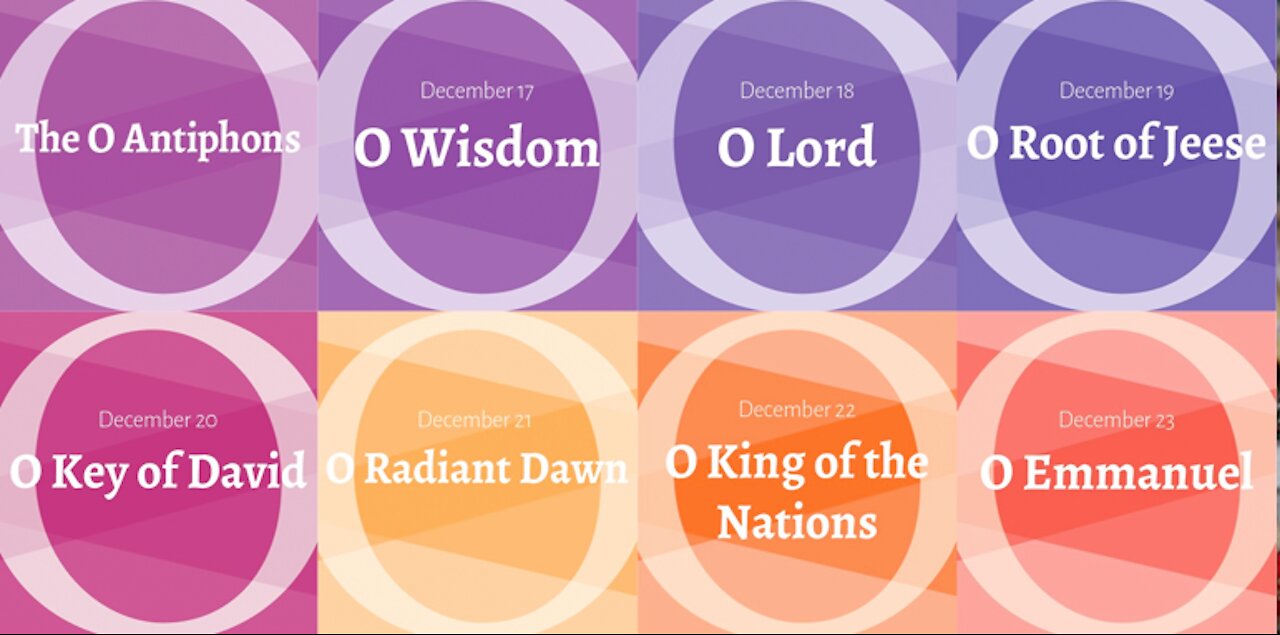Premium Only Content

O Antiphons IV
Week preceding Christmas, with our Advent calendar, light candles, elevate enthusiasm of the coming of the Lord. His tremendous goodness, a baby but more than that.
These seven names or titles, all from the Book of Isaiah, are:
O Sapientia — O Wisdom (Is 11:2-3)
O Adonai — O Lord (Is 11:4-5; 33:22)
O Radix Jesse — O Root of Jesse (Is 11:1)
O Clavis David — O Key of David (Is 22:22)
O Oriens — O Dayspring (Is 9:1)
O Rex Gentium — O King of the Nations (Is 2:4)
O Emmanuel — O God with Us (Is 7:14)
Collectively, they speak too Christ. Looking at the titles, we find an acrostic. Taking the first letter of each antiphon, working in reverse, we see the Latin words ERO CRAS. Literally, these words translate to, “Tomorrow I will be,” or perhaps more appropriately for Advent and the impending Nativity, “Tomorrow I will come.”
Beginning Dec. 17 of each Advent season, and for the next seven days, a special antiphon known as an O Antiphon is read before the Magnificat during Evening Prayer (Liturgy of the Hours great prayer of the Church after the Holy Mass and ties directly to the Holy Mass Liturgy) or before the Gospel at Mass. Sometimes called the Greater Antiphons, or the O’s of Advent (because they begin with that exclamation), the O Antiphons differ from the daily antiphons because they herald the coming birth of Christ. Originally written in Latin around the seventh or eighth centuries, these special antiphons are verses extracted from the Old Testament prophets — namely, Isaiah — and express the longing for the coming of the Christ. In fact, the word “come” is used in every O Antiphon.
Novus Ordo attendees will recognize them. Verses for the song O Come O Come Emmanuel, the great one prior to the 24th. Primary Advent hymn of the Church. Expanded throughout the season not just last seven days.
Each of the seven antiphons begins by addressing Jesus using an Old Testament title for the Messiah.
IV. Sacred Scripture as Teacher DEI VERBUM (Dogmatic Constitution on Divine Revelation)
#11 "all Scripture is divinely inspired and has its use for teaching the truth and refuting error, for reformation of manners and discipline in right living, so that the man who belongs to God may be efficient and equipped for good work of every kind" (2 Tim. 3:16-17, Greek text).
Proverbs is a treasure trove of what planting and harvesting in a spiritual and moral sense. Like a package of seeds at the garden store. One clearly sees on the package what harvest to expect. So to with Scripture, certain actions and inclinations yield certain predictable harvest.
Why does EO have different texts than Isaiah? To direct the attentive reader to other SS texts that expound on the idea. Like the footnotes at the bottom of your Bible that few of us Consult. Holy Mother Church knows the frailties of her children and ‘shouts’ looks at this.
-
 11:35
11:35
Fides et Ratio
11 months agoIgnatius’ Rules for Discernment Journey to God III
46 -
 2:05:10
2:05:10
Glenn Greenwald
9 hours agoAtlantic Leak Reveals Trump Admin's Foreign Policy Mindset; Appeals Court Extremely Skeptical of Trump's El Salvador Deportation Powers; Israel's Horrific Crimes in the Last 24 Hours | SYSTEM UPDATE #428
141K162 -
 1:53:20
1:53:20
megimu32
7 hours agoON THE SUBJECT: The Soundtracks That Raised Us – Iconic Movie Music from the 80s, 90s & Y2K
63K11 -
 3:01:26
3:01:26
Danny Polishchuk
12 hours agoEpstein Files + Government Group Chat Leaked with Guest Nick Bryant | Low Value Mail
46.2K5 -
 52:47
52:47
BonginoReport
9 hours agoDems Are LOST and The Biggest Losers Are Here To Help! (Ep. 11) - Nightly Scroll - 03/24/25
188K146 -
 53:58
53:58
Sarah Westall
8 hours ago“Millions and Millions have Died” Hidden Crimes of Big Pharma & Johnson & Johnson w/ Gardiner Harris
71.7K29 -
 1:40:49
1:40:49
Redacted News
10 hours agoSomething BIG is coming on April 2nd as Trump plans "Liberation Day in America" | Redacted News
270K323 -
 1:11:34
1:11:34
Kim Iversen
11 hours agoOops! Vance and Hegseth Accidentally Leak War Plans on Signal | Big WIN For Medical Freedom Movement
106K175 -
 1:06:30
1:06:30
TheSaltyCracker
10 hours agoSaltcast Stream 03-24-25
148K181 -
 54:16
54:16
LFA TV
1 day ago‘Anything Can Be Solved With Dialogue’ | TRUMPET DAILY 3.24.25 7PM
45.3K6